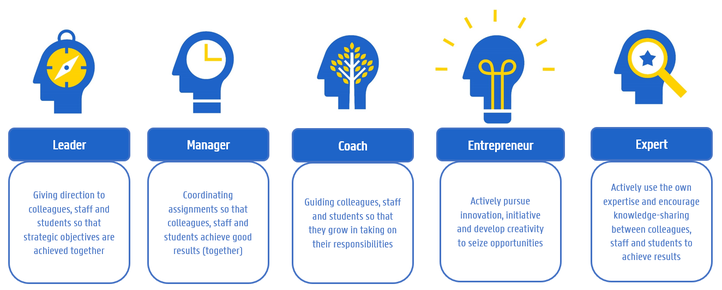Leadership roles of a supervisor
Leadership at Ghent University comprises a wide range of responsibilities, commitments, skills and competencies. Supervisors often struggle with the multitude of tasks and the tension between them: control versus trust, guiding versus coaching, individual versus team, and so on. To shape and develop leadership, the following roles have been differentiated: manager, coach, leader, expert and entrepreneur. This classification is purely structuring and is only meant to offer direction and tools to deal more consciously with the many tasks and responsibilities. Moreover, certain elements fit into more than one role.
Is each role important?
Everybody has one or more roles in which he or she feels more comfortable or stronger. Ghent University’s focus on talent and diversity means that a professorial career can lead to a deepening of one or more of these roles. The priorities may vary per job level and depending on the organizational context. For example, setting operational deadlines and enforcing procedures are mostly tasks that are part of the role as manager, while giving feedback fits in better with the role as coach.
However, focusing on a certain role must not result in a one-sided interpretation of leadership. For instance, taking up the guidance of young PhD candidate only in the role of expert is not in line with Ghent University’s vision of leadership. It is essential that a good supervisor also takes on the role of coach.
Development in the role
Leadership involves quite a few challenges which rarely require a simple approach. It does not mean that you are a superbeing who effortlessly solves all problems. Ghent University wants to support its supervisors and give them the opportunity to grow in taking up their responsibilities. In this respect, supervisors can choose to become even better in a role which they naturally like and are good at (deepening) or they can choose to stretch themselves and work on taking on a less developed role (broadening). It is your responsibility to invest in your personal growth through feedback, training and coaching.
The leadership roles will help supervisors dealing with the paradoxes in supervision, by becoming more self-aware of their preferred leadership role and will provide a framework which will increase supervisors’ confidence in taking up the appropriate role (Vilkinas, 2002). The model of leadership roles for PhD-supervisors is based on: self-awareness, flexibility, balance and is situational: each supervisor can choose the appropriate role dependent on the situation and needs of the candidate. A good supervisor knows when to use which role and can move comfortably between roles.
Leader
As a leader, you give direction to your PhD candidates and staff so that strategic and policy objectives can be achieved together.
A PhD supervisor in the role of leader motivates PhD candidates by bringing a clear, transparent and inspiring vision for the research group. You stimulate connections and collaborations by linking individual objectives to the (research) strategy and policy of the department. As a leader, you motivate others by inspiring them. You create involvement through, amongst others, participation and transparent communication. As a leader, you take up your responsibility by making (difficult) decisions
Manager
As a manager, you coordinate the tasks so that your PhD candidates and other staff can achieve a good result (together).
A PhD supervisor in the role of manager runs the multitude of responsibilities and tasks by properly planning and organizing everything. As a manager, you ensure the optimal development of people, time and resources. You set priorities and coordinate the tasks according to the talent and competencies of your team. You provide clarity regarding objectives, expectations and procedures. As a manager, you evaluate and adjust where necessary. In consultation and coordination, you work together towards a joint result, and you stimulate collaboration. You give your PhD candidates and staff the confidence they need to take up their responsibilities by focusing on autonomy, competence and connectedness.
Coach
As a coach, you guide your PhD candidates and staff so that they grow in taking up their responsibilities.
You provide feedback, enter into a dialogue and look for solutions together. You stimulate development by creating a safe and reflective working environment, by creating learning opportunities and focusing on talent. You pay attention to their well-being, for which you actively take your responsibility. You are accessible, empathetic and supportive. You support the passion, ambitions and the career development of the PhD candidate (within or outside academia). You actively build a team that works together, gives feedback and supports each other.
Entrepreneur
As an entrepreneur, you actively promote innovation, taking initiative and creativity so that opportunities with a possible added value for the university / faculty / department are made use of.
As an entrepreneur, a PhD supervisor is constantly looking for new opportunities (within and outside of the university). You generate new and useful ideas and make risky decisions. You dare to make mistakes and learn from them. As an entrepreneur, you also encourage your PhD candidates to search for opportunities. You give them room to be creative and innovate. You actively use your network to achieve this and encourage your PhD candidates to develop their own network.
Expert
As an expert, you actively use your professional knowledge and stimulate knowledge sharing among your colleagues, staff and students.
As an expert, a PhD supervisor has the necessary expertise, professional skills and knowledge to fulfil this role. You stimulate knowledge sharing among your PhD candidates. You share knowledge yourself with PhD candidates, tailored to their knowledge level. As an expert, you help your PhD candidates on their way to achieving a specific result (such as a project, funding, or the doctorate).
